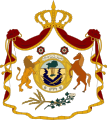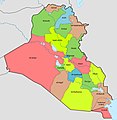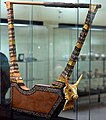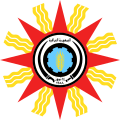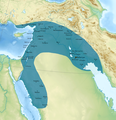Portal:Iraq
The Iraq PortalA view of Baghdad, Iraq
Iraq, officially the Republic of Iraq, is a country in West Asia and in the geopolitical region known as the Middle East. With a population of over 46 million, it is the 30st-most populous country. It is a federal parliamentary republic that consists of 18 governorates. Iraq is bordered by Turkey to the north, Iran to the east, the Persian Gulf and Kuwait to the southeast, Saudi Arabia to the south, Jordan to the southwest, and Syria to the west. The capital and largest city is Baghdad. Iraqi people are diverse; mostly Arabs, as well as Kurds, Turkmen, Assyrians, Armenians, Yazidis, Mandaeans, Persians and Shabakis with similarly diverse geography and wildlife. Most Iraqis are Muslims – minority faiths include Christianity, Yazidism, Mandaeism, Yarsanism and Zoroastrianism. The official languages of Iraq are Arabic and Kurdish; others also recognized in specific regions are Turkish, Suret, and Armenian. Modern Iraq dates to 1920, when a Mandate was created by League of Nations. A British-backed monarchy was founded in 1921 under Faisal. The Hashemite kingdom got independence from the UK in 1932. In 1958, the kingdom was overthrown and a republic was established. Iraq was ruled by the Ba'ath Party from 1968 to 2003, led by Al-Bakr and then by Saddam Hussein, as a one-party state. Iraq engaged in war with Iran from 1980 to 1988 and another war from 1990 to 1991, resulting from the invasion of Kuwait. An invasion launched by a US-led coalition as part of its "War on Terror" in 2003, sparking a war, resulted in the defeat of Ba'athists and Saddam's execution and continued with an insurgency and secratarian civil war. U.S. troops began withdrawing in 2008 and war officially ended in 2011. The subsequent continuing repression and sectarian policies of Nouri al-Maliki's government caused protests, after which a coalition of Ba'athist and Sunni militias took up arms during a campaign. The climax of the campaign was the offensive by the ISID that marked its rapid territorial expansion, prompting the return of American troops to fight the war, which lasted until 2017. Iran has also intervened since 2014, expanding its influence through sectarian parties and Khomeinist militia groups, triggering widespread protests. (Full article...) Selected article - The Iran–Iraq War, also known as the First Gulf War (Arabic: حرب الخليج الأولى, romanized: Harb alkhalij al'uwlaa), was an armed conflict between Iran and Iraq that lasted from September 1980 to August 1988. Active hostilities began with the Iraqi invasion of Iran and lasted for eight years, until the acceptance of United Nations Security Council Resolution 598 by both sides. Iraq's primary rationale for the attack against Iran cited the need to prevent Ruhollah Khomeini—who had spearheaded the Iranian Revolution in 1979—from exporting the new Iranian ideology to Iraq. There were also fears among the Iraqi leadership of Saddam Hussein that Iran, a theocratic state with a population predominantly composed of Shia Muslims, would exploit sectarian tensions in Iraq by rallying Iraq's Shia majority against the Baʽathist government, which was officially secular and dominated by Sunni Muslims. Iraq also wished to replace Iran as the power player in the Persian Gulf, which was not seen as an achievable objective prior to the Islamic Revolution because of Pahlavi Iran's economic and military superiority as well as its close relationships with the United States and Israel. The Iran–Iraq War followed a long-running history of territorial border disputes between the two states, as a result of which Iraq planned to retake the eastern bank of the Shatt al-Arab that it had ceded to Iran in the 1975 Algiers Agreement. Iraqi support for Arab separatists in Iran increased following the outbreak of hostilities; Saddam disputedly may have wished to annex Iran's Arab-majority Khuzestan province. (Full article...)Selected pictureDid you know...
Selected biography -
General imagesThe following are images from various Iraq-related articles on Wikipedia.
ListsTopicsCategoriesRelated portalsReligions in Iraq Arab states WikiProjectsThings you can do
Associated WikimediaThe following Wikimedia Foundation sister projects provide more on this subject:
Discover Wikipedia using portals | ||||||||





















